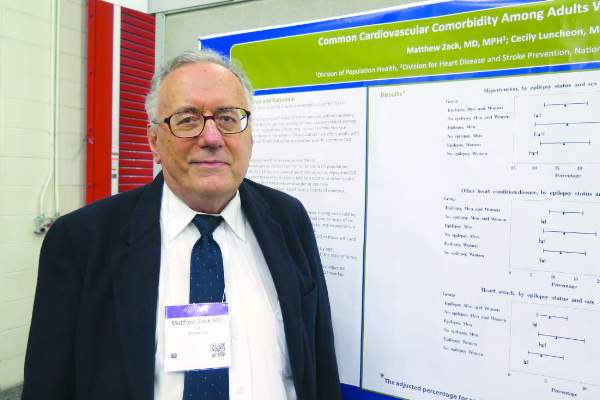AT AES 2016
HOUSTON (FRONTLINE MEDICAL NEWS) – Adults with epilepsy reported five of the six most common cardiovascular diseases more often than did adults without epilepsy, according to results from the 2013 National Health Interview Survey.
“Often, neurologists are busy treating the seizure, making sure the patient has proper treatment, but they often don’t have the time to look at these conditions that can cause deaths a lot more commonly than things like sudden unexpected death from epilepsy,” lead study author Matthew Zack, MD, said in an interview at the annual meeting of the American Epilepsy Society. “We’re not talking about mortality here, but it’s important for doctors to be aware of the fact that patients with epilepsy have increased risk for conditions like heart attacks, high blood pressure, and stroke.”
Dr. Zack, a medical epidemiologist in the division of population health at the Centers for Disease Control and Prevention, Atlanta, and his associates sampled adults aged 18 and older who answered questions about epilepsy and cardiovascular disease (CVD) as part of the 2013 U.S. National Health Interview Survey (NHIS), which is a cross-sectional survey of the civilian, noninstitutionalized U.S. population. They considered the 587 adults who answered “yes” to a question about ever having been told by a doctor or other health professional that they had a seizure disorder or epilepsy as having a history of epilepsy (“any epilepsy”) and the remaining 33,946 sampled adults as not having epilepsy. Next, the researchers compared the reported percentages of common CVD (hypertension, coronary heart disease, angina pectoris, heart attack, other heart condition/diseases, and stroke) in those with and without any epilepsy, and adjusted these percentages for sex, age, race/ethnicity, marital status, education level, the ratio of the family income to the poverty level, and region.
Compared to NHIS respondents without epilepsy, those with any epilepsy reported significantly more hypertension (36.4% vs. 30.2%), angina pectoris (3.9% vs. 2.0%), heart attack (5.2% vs. 3.3%), other heart condition/diseases (11.8% vs. 7.4%), and stroke (12.2% vs. 2.6%; P less than .01 for all associations). “We knew that persons with epilepsy often have a preexisting stroke, but we didn’t expect this for hypertension,” Dr. Zack said. “Hypertension is a risk factor for cardiovascular disease, but we also know that persons with epilepsy tend to smoke cigarettes a little bit more often than the general population. They also tend not to exercise or have physical activity. It had been a recommendation that they not participate in physical activity because it was thought to evoke seizures. But in fact, other follow-up studies have shown that’s not true, and that persons who engage in physical activity can often lessen the effects of epilepsy.”
Women with epilepsy reported significantly higher rates of three CVD conditions, compared with women who did not have epilepsy: hypertension (36.4% vs. 29.6%), angina pectoris (3.9% vs. 1.7%), and stroke (14.1% vs. 2.6%; P less than .01 for all associations). However, men with epilepsy reported only significantly more stroke, compared with men who did not have epilepsy (10.1% vs. 2.7%; P less than .01). Reasons for the differences observed between genders remain unclear and will require further analysis, Dr. Zack said. He acknowledged the self-reported nature of the NHIS as a chief limitation of the analysis. “We don’t have measurements of high blood pressure, we just have the person’s report that the doctor told them they had high blood pressure,” he said.
Dr. Zack reported having no financial disclosures.




